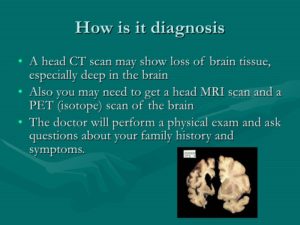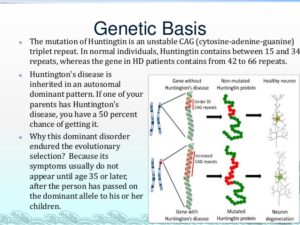Diagnosis
A preliminary diagnosis of Huntington’s disease is based primarily on your answers to questions, a general physical exam, a review of your family medical history, and neurological and psychiatric examinations.
Neurological examination
The neurologist will ask you questions and conduct relatively simple tests of your:
- Motor symptoms, such as reflexes, muscle strength and balance
- Sensory symptoms, including sense of touch, vision and hearing
- Psychiatric symptoms, such as mood and mental status
Neuropsychological testing
The neurologist may also perform standardized tests to check your:
- Memory
- Reasoning
- Mental agility
- Language skills
- Spatial reasoning
Psychiatric evaluation
You’ll likely be referred to a psychiatrist for an examination to look for a number of factors that could contribute to your diagnosis, including:
- Emotional state
- Patterns of behaviors
- Quality of judgment
- Coping skills
- Signs of disordered thinking
- Evidence of substance abuse
Brain imaging and function
Your doctor may order brain-imaging tests for assessing the structure or function of the brain. The imaging technologies may include MRI or CT scans that show detailed images of the brain.
These images may reveal changes in the brain in areas affected by Huntington’s disease. These changes may not show up early in the course of the disease. These tests can also be used to rule out other conditions that may be causing symptoms.
Genetic counseling and testing
If symptoms strongly suggest Huntington’s disease, your doctor may recommend a genetic test for the defective gene.
This test can confirm the diagnosis. It may also be valuable if there’s no known family history of Huntington’s disease or if no other family member’s diagnosis was confirmed with a genetic test. But the test won’t provide information that might help determinine a treatment plan.
Before having such a test, the genetic counselor will explain the benefits and drawbacks of learning test results. The genetic counselor can also answer questions about the inheritance patterns of Huntington’s disease.
Predictive genetic test
A genetic test can be given if you have a family history of the disease but don’t have symptoms. This is called predictive testing. The test can’t tell you when the disease will begin or what symptoms will appear first.
Some people may have the test because they find not knowing to be more stressful. Others may want to take the test before having children.


